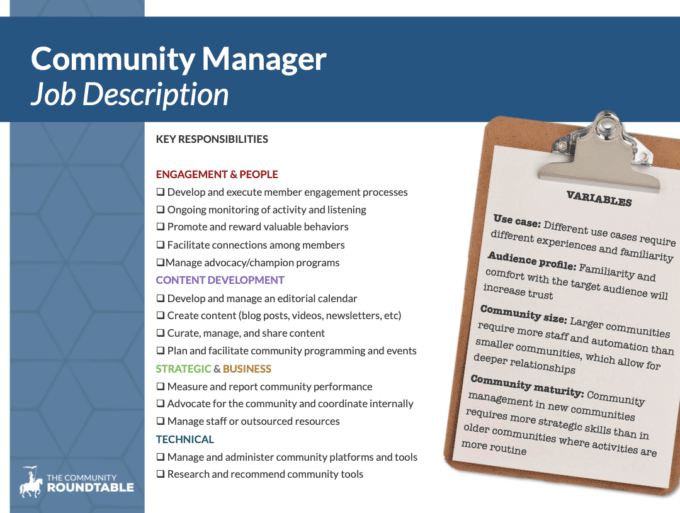OVERVIEW OF A COMMUNITY MANAGER
Community managers often oversee more processes than people and are the generalists of the community field. Although some community managers manage moderators or specialists, many work with other teams as the voice of the community. A community manager can be an entry-level role in some companies but on average they are mid-level professionals with over a decade in the workforce and over six years in community.
RESPONSIBILITIES
Community managers are the face and voice of the community. To make the community successful, they work with members to help them find value while ensuring organizational sponsors also receive value. Community managers balance tactical engagement and programming activities with more strategic responsibilities like planning and reporting. In small organizations, they are likely responsible for everything related to the community, while at larger organizations they may have direct reports, work on a larger team, or have the support of outsourced resources.

A Community Manager Job Description may include key responsibilities in these skill families:
ENGAGEMENT & PEOPLE
– Develop and execute member engagement processes
– Research and recommend community tools
– Ongoing monitoring of activity and listening
– Promote and reward valuable behaviors
– Facilitate connections among members
– Manage advocacy/champion programs
CONTENT DEVELOPMENT
– Develop and manage an editorial calendar
– Create content (blog posts, videos, newsletters, etc)
– Curate, manage, and share content
– Plan and facilitate community programming and events
STRATEGIC & BUSINESS
– Measure and report community performance
– Advocate for the community and coordinate internally q Manage staff or outsourced resources
TECHNICAL
– Research and recommend community tools
– Manage and administer community platforms and tools
These skills are a small example of the responsibilities and requirements of a successful community manager. As always, we encourage you to think about the unique requirements of your roles, and use our Community Skills Framework™ as inspiration for creating the right community manager job description for your organization.
Variables to consider when drafting your community manager job description include:
Use case: Different use cases require different experiences and familiarity
Audience profile: Familiarity and comfort with the target audience will increase trust
Community size: Larger communities require more staff and automation than smaller communities, which allow for deeper relationships
Community maturity: Community management in new communities requires more strategic skills than in older communities where activities are more routine
Profile of a Real Community Manager

CATHERINE HACKNEY Community Manager,
Confident Communities Consulting
Catherine’s Strengths:
- Empathy and Member Support (Engagement)
- Training Development & Delivery (Business)
- Tool Evaluation & Recommendation (Technical)
Why were you interested in your current role?
I am actually self-employed. I requested an official “community manager” role at the association I previously worked at but it was not an option at that time. I also happened to have another association come my way who needed part time community help, so I decided to create an LLC and leave the association I was working for. Since then I have been working at home full time for several organizations doing online community consulting and management. I knew I wanted to be a full time community manager shortly after I was given the role of community admin at an association over 5 years ago.
As soon as I saw the value members were getting from being able to openly discuss career challenges and day to day issues in a safe, private environment, I knew this was a powerful tool.
What advice do you have for someone seeking a role like yours?
Join as many online communities as you can! Especially those in the industry you are interested in focusing on and for other community managers. Don’t be shy – post, ask questions, respond to others, flex your own online community member muscles so that you can always keep the member perspective and experience top of mind. This will also get your name out there so you can start to build a network relevant to your interests and goals.
Practice asking for help from your network – there is a wealth of knowledge out there, use it to your advantage.
As long as you are willing to help others in return, you will have no trouble receiving the help you need.
